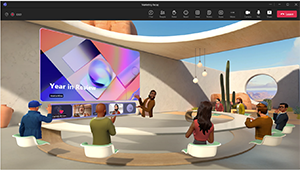News
Microsoft Mesh for Teams Coming in October Preview
- By Kurt Mackie
- September 27, 2023
A public preview of Microsoft Mesh for Microsoft Teams will arrive next month, per a Tuesday announcement.
Microsoft Mesh lets organizations create so-called "metaverse" environments for Microsoft Teams users, enabling meetings in three-dimensional (3D) virtual environments. These environments are called "immersive spaces" by Microsoft and are created without code using the Mesh Editor function. It's also possible to create immersive spaces using the Mesh Toolkit, which is for developers leveraging the Unity 3D development platform.
Immersive spaces will arrive first for users of the "classic" Teams (vs. the "new" Teams), the announcement noted.
Microsoft Mesh will work on a PC in two-dimensional form, but it will be "richer and more immersive" with a virtual reality headset. "Immersive spaces will be available initially with PC or Meta Quest VR devices," the announcement explained.
The use of Microsoft Mesh, even at the public preview stage, will require organizations and users to have Teams Premium licensing, on top of Microsoft 365 licensing. Microsoft Mesh won't just arrive. IT pros will need to "enable Microsoft Mesh in the Microsoft 365 Apps admin center once it becomes available," the announcement indicated.
Microsoft Mesh Tools
Microsoft supplies a set of premade immersive spaces to use, which can be customized by adding "images, videos and screen share in a shared 3D canvas." It's possible to have "live data connections" for these added elements, such as creating visual dashboards within the immersive spaces.
 [Click on image for larger view.]
Figure 1. A Microsoft Mesh immersive space with avatars and video (source: Sept. 26 Microsoft announcement).
[Click on image for larger view.]
Figure 1. A Microsoft Mesh immersive space with avatars and video (source: Sept. 26 Microsoft announcement).
The immersive spaces get populated with cartoon-like 3D avatars, representing people (which currently lack legs). The avatars can be customized by Teams users from a downloaded Avatar App. Microsoft Mesh permits 3D interactions by avatars, such as "the ability to grab objects or walk over to people."
Users who have already created 2D avatars will be able to transform them into 3D avatars with "just a click" using the View menu in Microsoft Teams using the preview, Microsoft indicated. The Microsoft Mesh preview lets organizations set seat assignments for avatars. It features "spatial audio and audio zones" so that avatars don't talk over each other. Other perks include the ability to play interactive games and react using "hearts, thumbs up, clap, and more" icons during meetings.
A Bumpy Ride
Microsoft Mesh, based on Azure technologies, was a key highlight at the Microsoft Ignite event in 2021. It was unveiled in a demo using Microsoft's HoloLens 2 mixed-reality headset. Microsoft Mesh reached the private preview stage in May of 2023.
Progress for Microsoft Mesh has been somewhat foggy, as Microsoft recently cut back or eliminated several metaverse efforts, dropping associated personnel and developer teams.
On the chopping block was Microsoft AltspaceVR and the Microsoft Mixed Reality Toolkit (now an open source project) back in January. Microsoft reportedly cut its Industrial Metaverse Core team in February. Microsoft announced in August that it was stopping its production of the Azure Kinect camera-sensor device used in HoloLens 2.
Despite all of those actions, Microsoft did state in February, that it was still committed to HoloLens 2, Microsoft Mesh and its industrial metaverse products.
About the Author
Kurt Mackie is senior news producer for 1105 Media's Converge360 group.